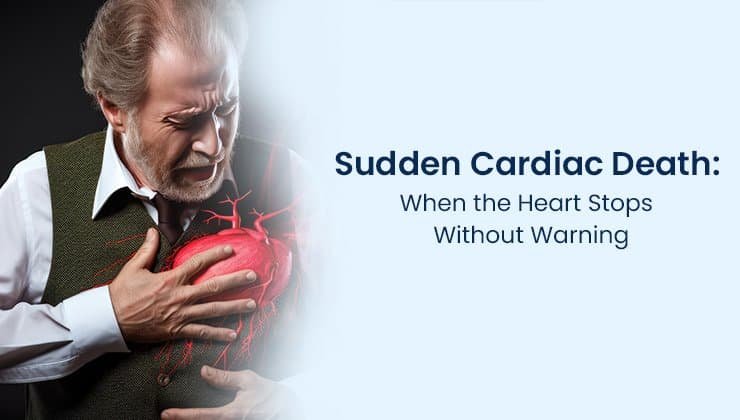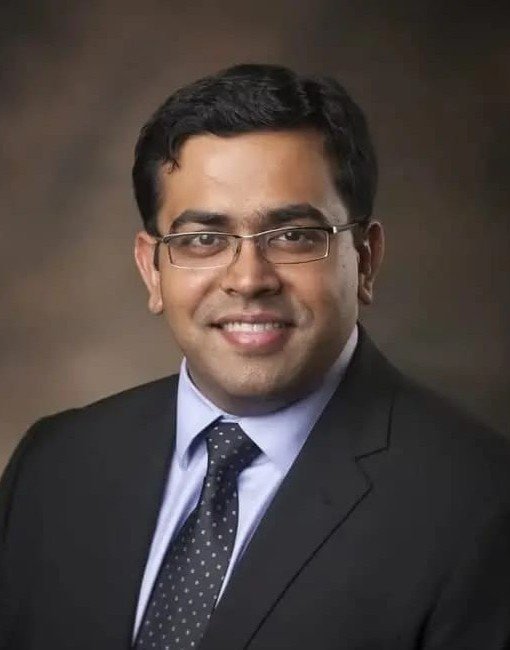Sudden cardiac death (SCD) is a leading cause of mortality worldwide. It refers to an unexpected death caused by a sudden loss of heart function, often occurring within minutes of symptom onset. In many cases, it strikes without any warning and so understanding the causes, risk factors, symptoms, diagnostic methods, and preventive measures is important for reducing the incidence of sudden cardiac death and improving the outcomes.
In this blog post, we will explore the causes, symptoms, risk factors, and prevention of sudden cardiac death.
What Is Sudden Cardiac Death?
Sudden cardiac death is a sudden, unexpected death that may occur within an hour of the onset of cardiac symptoms. It is often linked to a cardiac arrhythmia. It can be fatal if not immediately treated.
Sudden cardiac arrest may increase the risk of sudden cardiac death. When you have a sudden cardiac arrest, the heart stops pumping blood out to your body, and so, organs can’t receive any oxygen, leading to an immediate loss of consciousness and breathing, and sudden cardiac death.
Early management of heart disease, especially in people with heart conditions, is required to reduce the risk of sudden cardiac death.
What causes Sudden Cardiac Death?
Sudden cardiac death mostly results from ventricular arrhythmias, a life-threatening irregular heartbeats that prevent the heart from pumping blood. The causes of sudden cardiac death include
- Coronary artery disease, due to narrowing or blockage of coronary arteries, is the most common cause of sudden cardiac death
- Abnormal heart rhythm in people younger than 35. Inherited electrical disorders, including long QT syndrome or Brugada syndrome.
- Congenital heart issues present at birth or genetic conditions that affect the heart’s electrical system cause arrhythmias
- Hypertrophic cardiomyopathy is characterised by the thickening of the heart muscle, primarily affecting the ventricles.
- Cardiomyopathy due to alcohol use disorder, obesity, and genetic disorders of the heart muscle
What are the Risk Factors For Sudden Cardiac Death?
Several factors that may increase the risk of sudden cardiac death include
- Age and gender
- Previous heart attack, heart failure, or arrhythmias
- Coronary artery disease
- Prior episode of sudden cardiac arrest
- Family history of sudden cardiac arrest, cardiac death, or heart disease
- History of syncope
- Conditions, including hypertension, diabetes, high cholesterol and chronic kidney disease
- Dilated/ hypertrophic cardiomyopathy
- Significant changes in blood levels of potassium and magnesium
- Obesity
- Electrolyte imbalances, low potassium or magnesium levels
- Smoking, excessive alcohol consumption, poor diet, consumption of recreational drugs and lack of physical activity may contribute to heart disease and further sudden cardiac death
Read Also: Heart Diseases Myths vs Facts: What You Need to Know
What Are The Symptoms of Sudden Cardiac Death?
Sudden cardiac death may occur without any warning or prior symptoms. But some people may experience warning signs hours or weeks before sudden cardiac death, including
- Abnormal vital signs
- Heart attack
- Sepsis or severe infections
- Shortness of breath
- Chest pain
- Fatigue
- Unexplained fainting or fatigue
- Heart palpitations
If you notice symptoms, it is necessary to seek immediate medical attention and begin CPR if trained.
The immediate sudden cardiac death signs include sudden collapse, no pulse, no breathing, unresponsiveness, and gasping or abnormal breathing.
How is Sudden Cardiac Arrest Diagnosed?
A healthcare provider may confirm sudden cardiac arrest after ruling out other causes. They may suspect sudden cardiac arrest if you were not breathing, did not have a pulse, or were not conscious.
For the individuals who are at risk of sudden cardiac arrest and death, different diagnostic tests may be required to identify underlying heart conditions, including
- ECG to measure heart structure and function
- Stress testing to evaluate the heart’s response to exertion
- Holter monitor to detect arrhythmias
- Genetic testing is a hereditary condition is suspected.
Read Also: The Difference Between Cardiac Arrest, Heart Attack & Heart Failure
How to Prevent Sudden Cardiac Death?
Many cases may be avoidable through detection, proper treatment, and lifestyle changes.
You may reduce the risk of developing sudden cardiac death by
- Maintain regular follow-up appointments with your healthcare provider
- Avoid smoking and taking tobacco products
- Adhere to the medications prescribed by the healthcare provider
- Have genetic testing as suggested by the provider
- Make lifestyle changes, including exercising regularly, eating a heart-healthy diet, and limiting foods high in fat.
- For individuals with severe coronary disease, angioplasty or coronary bypass surgery may be performed to improve blood flow and reduce heart complications
- Manage existing conditions, including blood pressure, diabetes, and cholesterol
- Familiarise with CPR (cardiopulmonary Resuscitation and an Automated External Defibrillator to provide immediate care if someone collapses
Conclusion
Sudden cardiac deaths continue to be a major health problem and are unpredictable. Having regular check-ups, a healthy lifestyle, and timely medical intervention may prevent sudden cardiac deaths.
At Heart360 Care, our experienced cardiologists provide comprehensive diagnosis and personalised treatment plans if you show the signs of heart disease. If you or your loved ones have heart-related questions, you may schedule an appointment with Dr Nikhil of Heart360 Care!
Frequently Asked Questions
A heart attack occurs when the blood flow to the heart is blocked. Sudden cardiac death is the death that may occur due to cardiovascular or other reasons within an hour of the onset of symptoms. A heart attack may lead to sudden cardiac death but they are not the same.
You should call the emergency services immediately. You may perform CPR (chest compressions) if you are trained to do so. You may use an AED (automated external defibrillator). Immediate medical attention may help save the person.
It is rare in young people, but it may happen, especially in individuals with undiagnosed genetic heart conditions, including hypertrophic cardiomyopathy or long QT syndrome. It may rarely occur in young athletes.
Sudden cardiac arrest may be lethal if not treated immediately. You may recover from sudden cardiac arrest, especially if diagnosed early and the treatment is administered immediately. CPR (cardiopulmonary resuscitation) using a defibrillator may increase the chance of survival.










2 thoughts on “Sudden Cardiac Death: What You Need to Know”
Comments are closed.